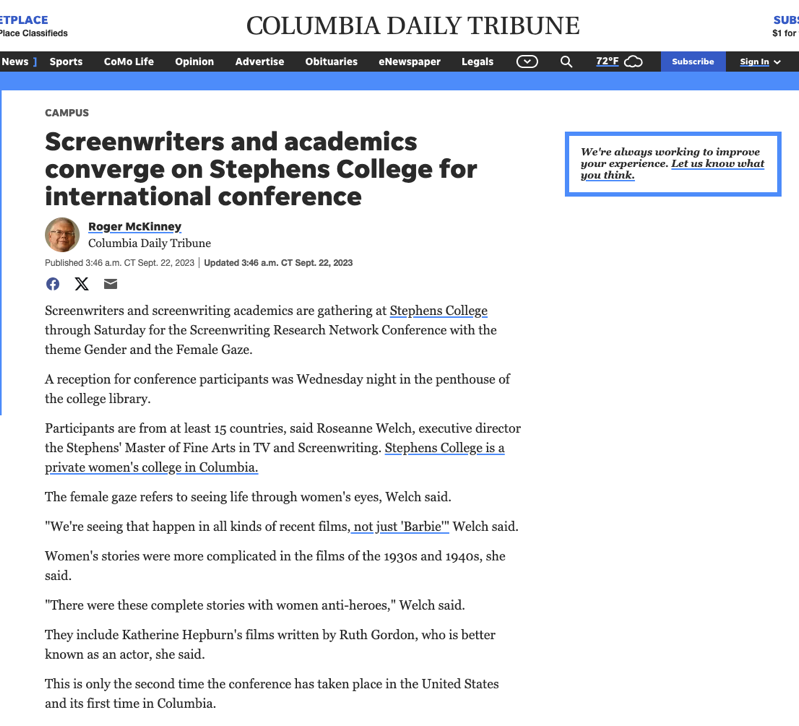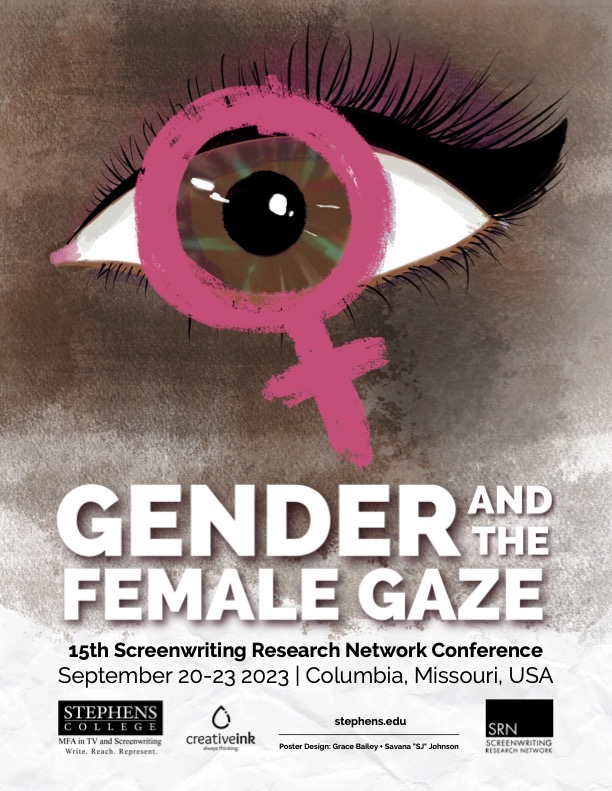
CALL FOR PAPERS
SRN 2023: GENDER AND THE FEMALE GAZE
September 20-23, 2023
The SRN (Screenwriting Research Network) is comprised of scholars, writers, and practice-based researchers. Started in 2006, the network currently has 700 members from 50+ countries. The aim of the annual International Conference is to continue, and expand, discussions around the screenplay and to strengthen a rapidly emerging, and global, research network. For more information, please visit our website: http://screenwritingresearch.com
The 15th annual conference is organized by the Stephens College MFA in TV and Screenwriting and the School of Integrative Studies at Stephens College. The arts and humanities thrive in Columbia, Missouri, as dozens of on- and off-campus performances occur year-round at Stephens, making the College one of Columbia’s premier centers for the performing arts.
Call for Papers:
Coming from a host college that focuses on female participation in the arts, the conference theme “Gender and the Female Gaze” wants to discuss the contributions of female screenwriters and the plethora of female-focused stories told on screen from the Silent Era through the modern-day. We encourage and embrace research that is around women of different ethnicities, religious and cultural backgrounds, and particularly hope to engage topics which relate to minority cultures within minority (and majority) communities.
We are thus particularly interested in abstracts for presentations on (but not limited to) the following topics:
- Female screenwriters in silent cinema
- The influence of female writer (-directors) in contemporary culture
- Case studies on individual female screenwriter’s work
- Patterns in the women-centered stories that have been brought to the screen
- Historiography of manuals and screenwriting pedagogy where this reflects the work of female screenwriters
- Censorship of women’s stories and women’s writings
- Female screenwriters within writing partnerships
- The work of female screenwriters within script production (e.g. as showrunners, script editors or consultants)
- The question of a female voice within screenwriting
- The cultural influence of female characters created by female screenwriters
- The way life experiences led to the story told
- The challenges to their projects screenwriters often meet which speak to political, religious, gender or other barriers which may not apply to their male counterparts.
- The real-world impact of the script on its audiences and society.
- Examples of the ways women stepped out of traditional roles to work for change and an improved future for themselves and their communities through screenwriting.
- How female screen stories tackled issues of culture, religion, identity, gender and race
- How women have negotiated screen industry norms and practices, biases and social hurdles in order to tell their screen stories.
- Ways in which the professional woman’s everyday life (e.g. romance, marriage, parenthood status or citizenship) has been challenged or made more challenging because of her professional work, and vice versa.
- Issues caused by unreliable narrators of history
- Studies of cultural appropriation in screenwriting; cultural imperialism; cultural disconnect and/or discord which comes about through discourses of power
- Research into the ways in which money/ finance precludes certain stories from being told, even by successful screenwriters
Proposals for presentations beyond the theme of the conference are also welcome. The aim of the SRN being to foster research that rethinks the screenplay in relation to its histories, theories, values, and creative practices, any proposal underpinned by such research will be considered. We expect papers on the broad topics of pedagogy, theory, and practice – but even those may reflect the conference theme via the choices of writers chosen for inclusion in the study.
Essential Information:
Deadline for abstracts: January 6, 2023
Acceptances: February 15th, 2023
Registration by: June 30, 2023
Submissions via email and contact:
Rosanne Welch
rwelch@stephens.edu
Submission of abstracts/proposals
- Proposals/Abstracts can be sent as either a Word or PDF document: please indicate
- “yourname_PROPOSALTYPE” (i.e. paper or panel) clearly in the file title and in the subject heading of your submission.
- All presentations will be delivered in person, in English, and be underpinned by original research work being conducted by the presenter. Multiple presenters (max. 2) for co-written papers are allowed.
1.) Proposals for traditional 20-minute papers, followed by Q&A. They should include:
- Title
- Author’s name
- Affiliation (university, independent, practitioner, etc.)
- Contact details
- Abstract (max. 300 words)
- 4-6 keywords
- short bio (max 150 words), detailing your research activity, publications and/or screenwriting practice – and if the piece contributes to the conference theme please note.
2.) Proposals for Pre-constituted panels
Proposals for pre-constituted panels can be submitted by any of the presenters or the Chair of the panel and should include:
- title of the panel
- brief outline (100 words maximum) of the overall topic
- abstracts of all the presentations – no more than 3 papers – following abstract guidelines listed above.
Abstracts should follow the guidelines for individual papers as above and include short bios and contact details of both the speakers and the panel Chair. Wherever possible, the Chair should NOT be one of the presenters. If a proposal for a pre-constituted panel does not include a Chair, the Conference Committee will appoint one. All proposals should indicate “Panel Proposal SRN 2022 in the file title and in the subject heading of the submission email.
Website and registration
The Website for the conference will include a wealth of useful information (e.g., registration, travel arrangements, accommodation options), as well as all the updates and the program leading up to the Conference. It will go live in early December.
The conference fee is expected to be in the region of $120 USD.
![Flipping Your Classroom with Dr. Rosanne Welch - Screenwriting Research Network Working Group on Comparative Screenwriting [Video]](https://rosannewelch.com/wp-content/uploads/2024/04/srn-flipped-2024.jpg)
![Flipping Your Classroom with Dr. Rosanne Welch – Screenwriting Research Network Working Group on Comparative Screenwriting [Video]](https://rosannewelch.com/wp-content/uploads/2024/04/srn-flipped-2024-1.jpg)


![Dr. Rosanne Welch Interview - She Served Too, KPON FM, Columbia, MIssouri [Audio]](https://rosannewelch.com/wp-content/uploads/2023/10/rmw-kopn-interview.gif) While I was on the Stephens College campus a couple of weeks ago for the
While I was on the Stephens College campus a couple of weeks ago for the 
![17 We Stand On The Shoulders…from When Men Forget Women: The Many Ways Male Screenwriters Fail to Mention their Female Colleagues [Video]](https://rosannewelch.com/wp-content/uploads/2022/08/rmw-scms-2021-17.jpg)
![16 Joan Didion & John Gregory Dunne from When Men Forget Women: The Many Ways Male Screenwriters Fail to Mention their Female Colleagues [Video]](https://rosannewelch.com/wp-content/uploads/2022/08/rmw-scms-2021-16.jpg)
![15 Nice Guys and Allies from When Men Forget Women: The Many Ways Male Screenwriters Fail to Mention their Female Colleagues [Video]](https://rosannewelch.com/wp-content/uploads/2022/07/rmw-scms-2021-15.jpg)
![Screenwriting Research Network Conversation #2 – Memories of Our Previous International Conferences [Video]](https://rosannewelch.com/wp-content/uploads/2022/07/srn-conversations-002.gif)
![14 Obituaries Are Unreliable Narrators from When Men Forget Women: The Many Ways Male Screenwriters Fail to Mention their Female Colleagues [Video]](https://rosannewelch.com/wp-content/uploads/2022/07/rmw-scms-2021-14.jpg)